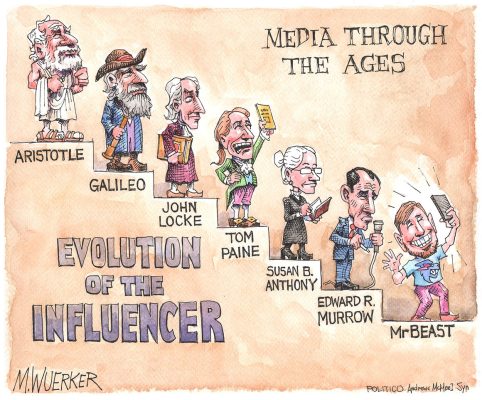George Papandreou believes in democracy.
Not in the modern iteration, which he sees as corrupted by political gridlock and citizenries that feel disempowered or powerless, but in demos, the principle of total participation conceived by his Greek ancestors.

He believes today’s democratic societies – and even the undemocratic ones – must reimagine the way they conduct their political affairs.
Papandreou called Greek’s recent financial crisis an “alarm bell for a global crisis of democracy” – an alarm sounded, ironically, by the very country that birthed democracy.
The former prime minister of Greece, who served during the disastrous financial crisis in 2009 and stepped down two years later, spoke to a crowd of over 1,000 Speaker Series ticketholders at the Redondo Beach Performing Arts Center Tuesday night.
Papandreou joins a star-studded list of people who have spoken at the Speaker Series event in Redondo Beach, including Tony Blair, Bill Clinton, and Mikhael Gorbachev.
His speech Tuesday night was reminiscent of a TED Talk he delivered at the TED conference earlier this year – a call to re-instate democracy in its purest form, to equalize the political playing field and empower the people.
That TED talk sparked sharp criticism from protestors who complained Papandreou was speaking about lessons learned from the Greek crisis while Greek citizens were bearing the real brunt of the austerity measures imposed during his term.
But Tuesday night in Redondo Beach, Papandreou was candid about opposition to his approach.
“Implementing such drastic reforms in the midst of a crisis… That was not easy,” he said. “Maybe that’s why I’m here [and no longer prime minister].”
The Minnesota-born and Amherst-educated George is not the first Papanedreou to fiercely back the principles of democracy and equality.
His father was exiled fighting for democracy. His grandfather, six times.
When George was 14 years old, a soldier arrived at his family’s home and held a gun to his head, demanding to know where his father was.
It was this experience, he said, that planted in him a passion to fight not with weapons but with a quiet commitment to the principles his father and grandfather held dear.
Papanedreou was first elected to Parliament in 1981, and in succeeding years held a number of ministerial portfolios.
As Minister of Foreign Affairs, he explained, he handled a particular situation that taught him the value of treating people not as political allies or opponents but as fellow human beings.
Greece and Turkey had been longtime enemies, and were pushing each other nearer to the brink of war. But in 1999, a devastating earthquake struck just outside Istanbul.
“I decided to take a risk and nobody expected it… I said, ‘You know, we have problems with the Turks but in the end we’re all human beings,’” Papandreou said. “I asked the Greeks to give blood to the Turks and, lo and behold, there was, to my surprise, a huge outpouring of Greeks giving blood to the hospitals… We also sent a team of firemen to help pull out people from the rubble and I think the most emotional moment, most moving moment, was when one of the Greek firemen pulled out a young Turkish boy, alive, from the rubble and the next day all the Turkish newspapers had Greek titles thanking Greece for this.
“Just a month later, Greece had an earthquake outside Athens… and the Turks came to help us.”
It was a lesson in humanitarianism he would draw upon during another difficult period in his political career.
When Papandreou entered office, Greece was running a deficit of 15 percent and the people were losing confidence in their government.
“I was facing not only a budgetary crisis but a democratic one,” he said. “In addition to having to put our fiscal house in order I was challenged to rebuild trust in our society, improve governance, actually fundamentally reimagine our democracy, how we redistribute power to citizens, take power away from some vested interests.”
After he was elected, his first move was to “come clean” to the world.
“Honesty, no matter how painful, was the only way to show we were willing to change,” he said. Coming clean, he found, was acutely painful.
Papandreou went immediately to Brussels and asked the E.U. for a bailout to sustain his country as its government made major institutional reforms so as to avoid bankruptcy.
“If you think that it’s complicated to pass a bill through the House and the Senate, just think [about] trying to pass that kind of a measure through 27 parliaments in 24 different languages,” he said. “An ideological battle ensued on how and why we should support Greece in its endeavor to make real change.”
It was the political gridlock in the European Union, he said, which “magnified and multiplied the problem” by endangering the credibility of the Eurozone.
The Eurozone began “unraveling,” he said. Though Greece’s GDP is only one-third of L.A.’s, the global markets went into a tailspin. The markets doubted Greece, and by extension, they doubted the European Union.
It was at this point that Papandreou realized the “most valuable currency [a government] can have is credibility” – precisely, he said, what is presently at stake in the U.S.
“Don’t forget why Standard & Poors, a rating agency, downgraded the U.S. in 2011: inability, they said, to reach political compromise is a threat to economic confidence and stability,” Papandreou said.
Ultimately, the European Union agreed to support Greece, and in exchange for a loan, Papandreou’s government implemented the “fastest fiscal adjustment program by any advanced economy, ever,” he said.
The cuts were drastic: GDP by 6.5 percent, the public service by 200,000 jobs, and wages and pensions by an average of 30 percent.
Forty-seven counties were consolidated into 13.
Papandreou’s administration made some other imaginative reforms, too. There were vested interests to divest.
Pharmaceutical companies had been pressuring doctors to overprescribe medications, so the government declared that doctors would have to catalog all prescriptions (in confidence) into a digital database. Overnight, prescription costs dropped by 30 percent.
Another example was a luxury tax imposed on swimming pools. Greece’s tax system was cumbersome, and the government was losing millions in undeclared income and offshore assets. When people failed to declare their swimming pools, the government used Google Earth to find them.
“It’s sort of like a heart attack,” he said. “You obviously need to treat the symptoms, which in this case would be the deficit, but in the end you need to have the time to change your lifestyle, which is actually the root cause and that’s the reforms in this case. Greece was not, and is not, poor, but was a mismanaged country. That’s what we needed to do – make total change.”
Mismanagement created Greece’s financial disaster, but global trends deeply exacerbated it.
Among these, he said, are the prevalence of “hyper-partisan politics,” growing global inequality, and economic globalization.
“The speed and power of events in our global economy often overwhelm our democratic processes,” Papandreou said. Do democracies have time for public deliberation, he asked, when the markets are moving at warp-speed?
He recalls negotiating with the European Union to secure a fund for providing countries with emergency loans. Deliberations stretched past midnight, but at 2 a.m., someone declared the decision would have to be made within 10 minutes. The stock markets would be opening in Tokyo.
Moreover, Papandreou said, wealth is becoming increasingly concentrated in the hands of the few. Inequality is the world’s foremost human rights problem, according to the World Economic Forum – “not exactly a radical left-wing group,” he said.
And so, as Greece deals with an economic struggle – the government is now running a primary surplus, but youth employment is still hovering at 60 percent – and undergoes a difficult political transition, the world can look to it as a microcosm for what can happen during “democratic crisis,” Papandreou said.
The only way to restore democracy is to empower citizens, he said.
“We also need to rethink how democracy is working – [there is] gridlock in the U.S., gridlock in the European Union at times, the Arab Spring – some people call them failed experiments – and as our democracies become less effective our citizens also feel less empowered, and this is a fertile ground for populism and polarization,” he said. When they feel powerless, people search instead for substitutes – the leadership of dictatorial rulers or religious fundamentalism, for example. Otherwise, they surrender to apathy.
“Three years ago it was unthinkable that a neo-Nazi party could sit in the Greek Parliament,” he said. “Today they have 18 MP’s (members of Parliament) who have instilled, even cultivated, hatred, racism, and violence in parts of our society. This is why we need to bring our cities into our politics and empower them.”
Like the ancient Greek system, democracy should require active political participation from all persons. Papandreou noted that the word “idiot” is derived from the Greek idiōtēs, which means “a private person unconcerned with public affairs.”
Papandreou believes globalization is making democratic innovation – the reimagining of democracy in a world of local politics and global economics – increasingly feasible and accessible to all. An example was WikiLaws, a website he founded as prime minister to invite all people of Greece into legal deliberations.
This is the kind of innovation governments need to make, he said, in order to renew their commitment to the principles of equality and democracy.
“These,” he said, “are not exclusively Greek problems, and this is not an exclusively Greek crisis.”










